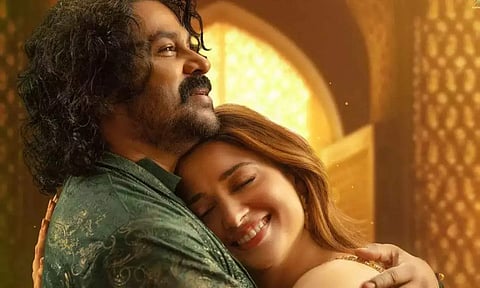Bandra Movie Review: A sluggish and sloppy potboiler
Rating:(2 / 5)
From Rajinikanth to Kamal Haasan to Glenn Maxwell, Mumbai has always been a favourite hunting ground for mass heroes. In Indian cinema, there hasn't been a perfect backdrop for gritty, gangster stories. Though Bandra's promos also promised something similar, it starts off on a surprisingly different note. Sakshi, an aspiring filmmaker, is trying hard to make her debut film when she stumbles upon the story of Tara Janaki (Tamannaah), a celebrated Bollywood star of the 90s. A filmmaker/journo unravelling little-known details about a former icon is a template that has been explored earlier in films like Mahanati, Sanju, and Thirakkadha. Bandra, however, slightly differs, as what starts off Tara's story ends up being Aala's (Dileep).
Cast: Dileep, Tamannaah, Dino Morea, Kalabhavan Shajohn
Director: Arun Gopy
Tara Janaki's character is the emotional core of the film and it is clearly inspired by the lives of several Indian female actors of the 90s, who entered the industry reluctantly. The closest resemblance is with the late actor Divya Bharti, who tragically died when she was at the peak of her career. Tamannaah, in her Malayalam debut, is at her graceful best, even though her character gets unfairly sidelined after a point. Very early in the film, Shajohn's character Mirchi says, "This is not just a heroine's story, there's also a hero in it." From that moment, the focus shifts to Aala. Arun Gopy, who presented a grounded Dileep in Ramaleela, opts for a larger-than-life portrayal this time as the actor makes his introduction in a sequence that's strikingly similar to Ameer's in Vada Chennai.
Lately, a recurring pattern has been noticed in the characterisation of Udaykrishna's heroes. Most often than not, they are either cops or dons, who live with a different identity. He tries to subvert that in Bandra by choosing not to show Aala's past. We only hear random dialogues like, "Ninakk ariyatha sthalam onumallalo Mumbai"... or "enik aa pazhaya Aalaye venam" as a reminder about what he was. Though the film's brilliantly designed opening credits gives a faint picture, it ain't enough. In hindsight, it's a choice that backfired dearly because you never feel Aala to be as powerful as the film intends to project him.
There's something amiss about Dileep's performance also. The character demands robust body language, but the actor ends up being needlessly stiff walking around like he's carrying the whole world's weight on his shoulders. Unlike his last film Voice of Sathyanathan, which was written to his strengths—comedy, Bandra doesn't have enough scope for lighter moments. Except for this one unintentionally funny moment when Tara asks Aala, who is in prison, sukhano...
After a rather decent first half where the drama around Tara's situation is established, the narrative turns messy. A reluctant actor till then, Tara is suddenly concerned about her future and shuns Aala away. These are some blatant inconsistencies in character development. Sarathkumar, in a generic cameo, acts as the catalyst to ignite the action. However, it's hard to believe they are choreographed by Anbariv, the brains behind the riveting action in KGF, Vikram, and the more recent RDX. There's hardly any method to the stunts apart from slo-mo shots of the lead actor punching and goons flying around. To credit where it's due, Shaji Kumar's cinematography and Sam CS' score are exceptional. They deserved better.
Udaykrishna has often been criticised for his dated writing and tendency to borrow ideas—mostly from other hit films, and sometimes from his own. Bandra also suffers from these issues. One of the most absurd moments in the film is the placement and picturisation of the song, Rakka Rakka. In the scene before, you see Tamannaah dressed pristinely as a princess, and in the next, you see her wearing skimpy clothes and performing some awkward steps. In fact, the song's inclusion seems like an afterthought following the sensational success of her dance number, Kaavaalaa. Another such ridiculously 'inspired' moment is the tail end, a direct ripoff from Lucifer, or even Kurup. It does nothing but leave a bad aftertaste while walking out.
The best way to perhaps rescue this film would've been to make Kalabhavan Shajohn, the drunkard narrator here, to be unreliable like Leo's Mansoor Ali Khan. But too late, I guess...

